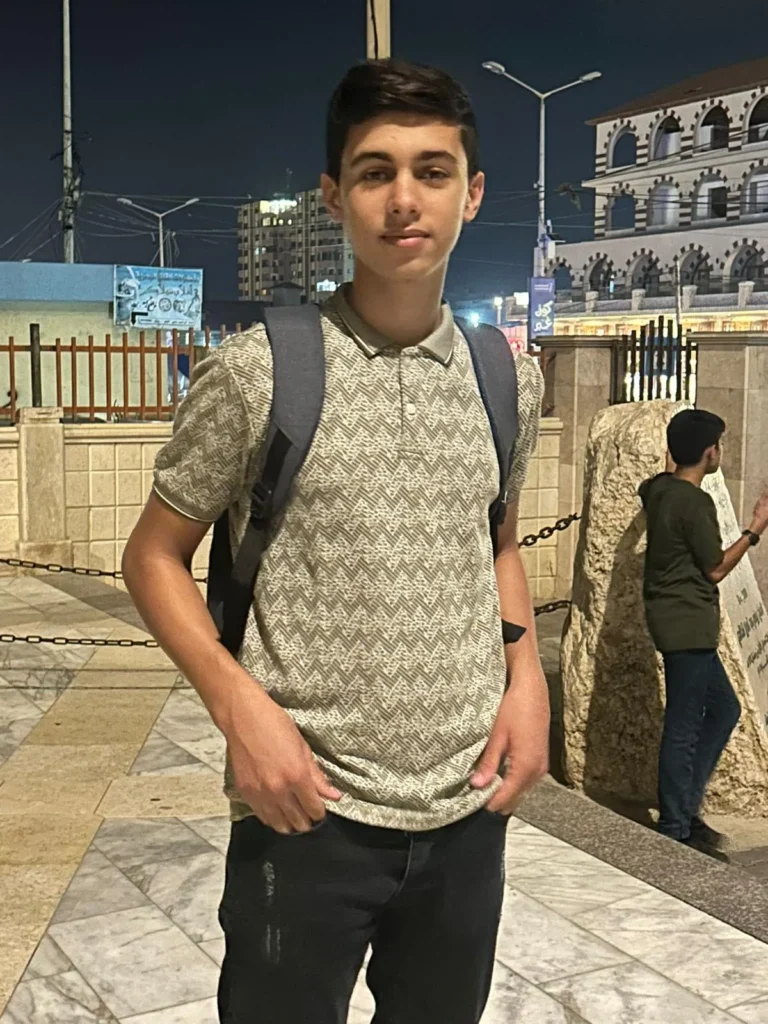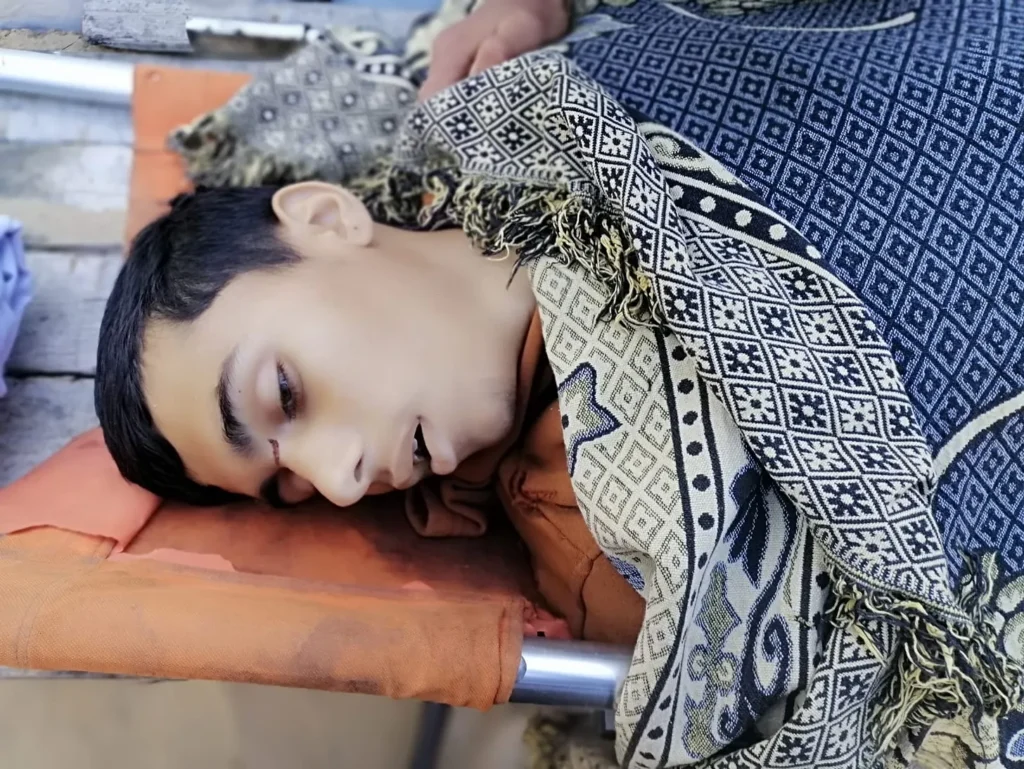The Death of Amr
PALESTINE - ISRAEL, 8 Apr 2024
The Chris Hedges Report – TRANSCEND Media Service
Over 13,000 children have been killed in Gaza. Amr Abdallah is just one of them.
3 Apr 2024 – On the morning Amr Abdallah was killed, he woke before dawn to say his Ramadan prayers with his father, mother, two younger brothers and aunt, in an open field in southern Gaza.
“It is You we worship and You we ask for help,” they prayed. “Guide us to the straight path — the path of those upon whom You have bestowed favor, not of those who have evoked Your anger or of those who are astray.”
It was dark. They made their way back to their tents. Their old life was gone — their village, Al-Qarara, their house — built with the money Amr’s father saved during the 30 years he worked in the Persian Gulf — their orchards, their school, the local mosque and the town’s cultural museum with artifacts dating from 4,000 B.C.
Blasted into rubble.
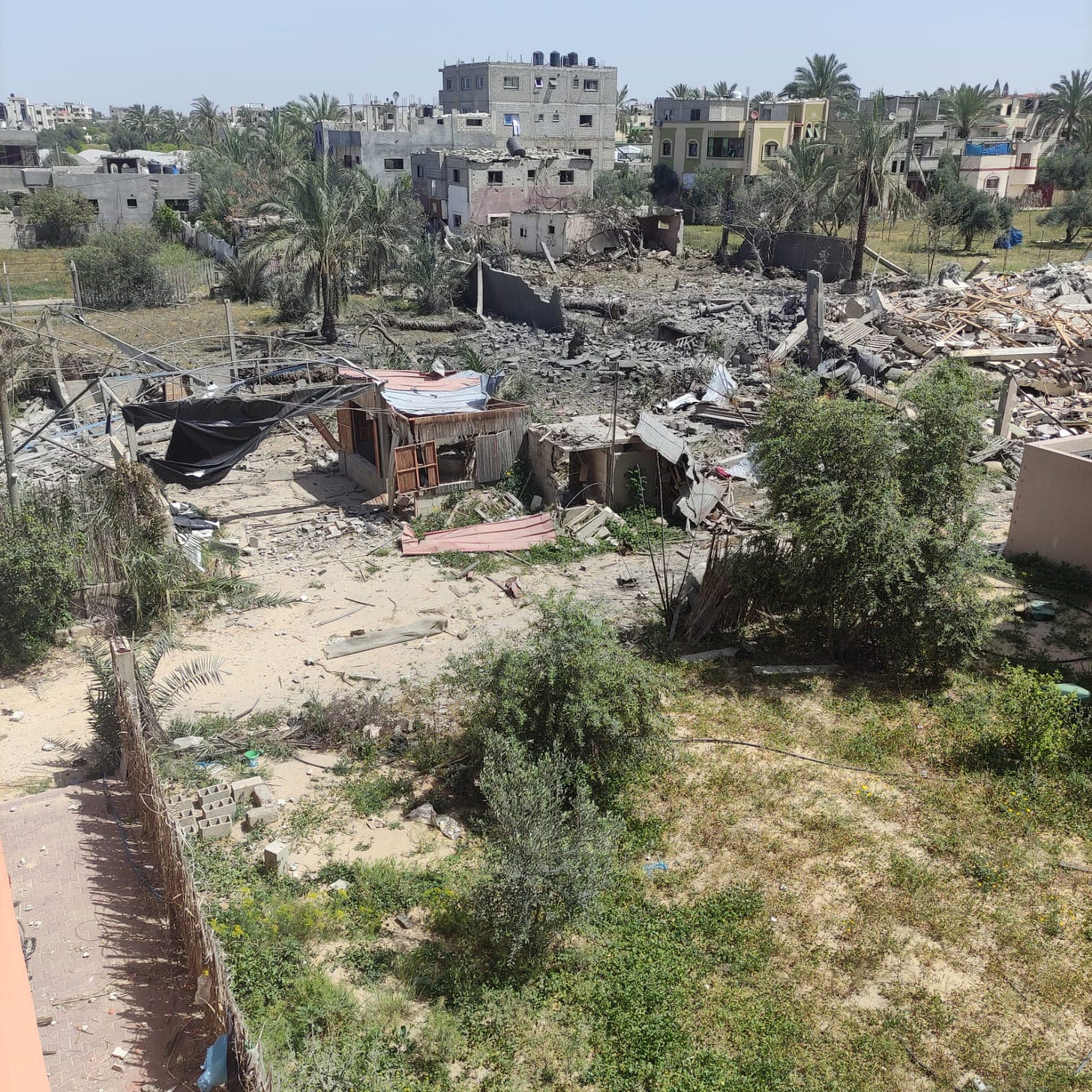
The ruins of Amr’s home
Amr, who was 17, would have graduated from high school this year. The schools were closed in November. He would have gone to college, perhaps to be an engineer like his father, who was a prominent community leader. Amr was a gifted student. Now he lived in a tent in a designated “safe area” that, as he and his family already knew, was not safe. It was shelled sporadically by the Israelis.
It was cold and rainy. The family huddled together to keep warm. Hunger wrapped itself around them like a coil.
“When you say ‘Amr’ it’s like you’re talking about the moon,” his uncle, Abdulbaset Abdallah, who lives in New Jersey, tells me. “He was the special one, handsome, brilliant, and kind.”
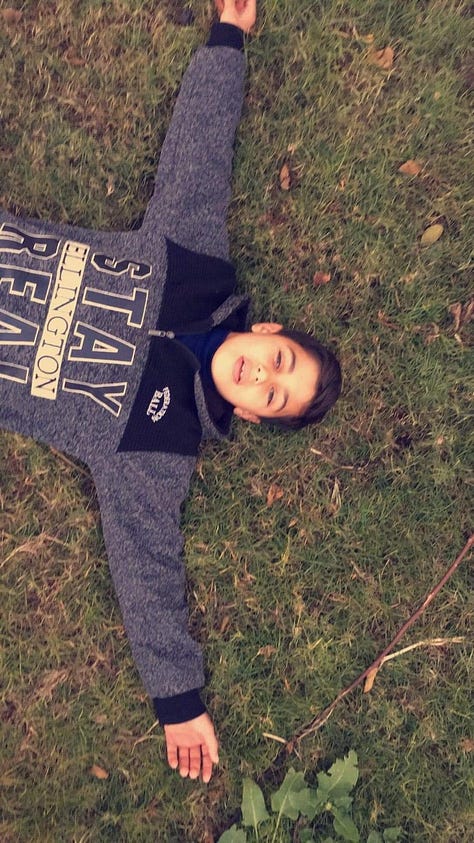
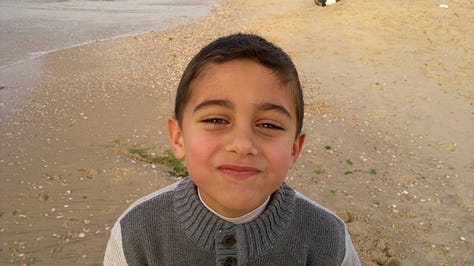
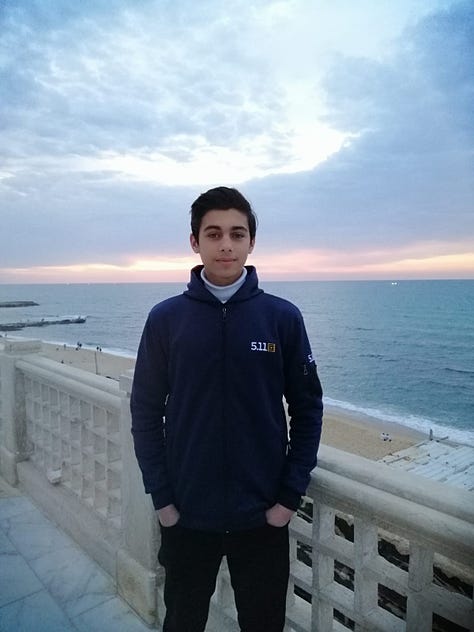
Amr in Gaza
The Israeli attacks began in northern Gaza. Then they spread south. On the morning of Friday, Dec. 1, Israeli drones dropped leaflets over Amr’s village.
The leaflets read:
“To the inhabitants of al-Qarara, Khirbet al-Khuza’a, Absan and Bani Soheila, you must evacuate immediately and go to shelters in the Rafah area. The city of Khan Yunis is a dangerous combat zone. You have been warned. Signed by the Israeli Defense Army.”
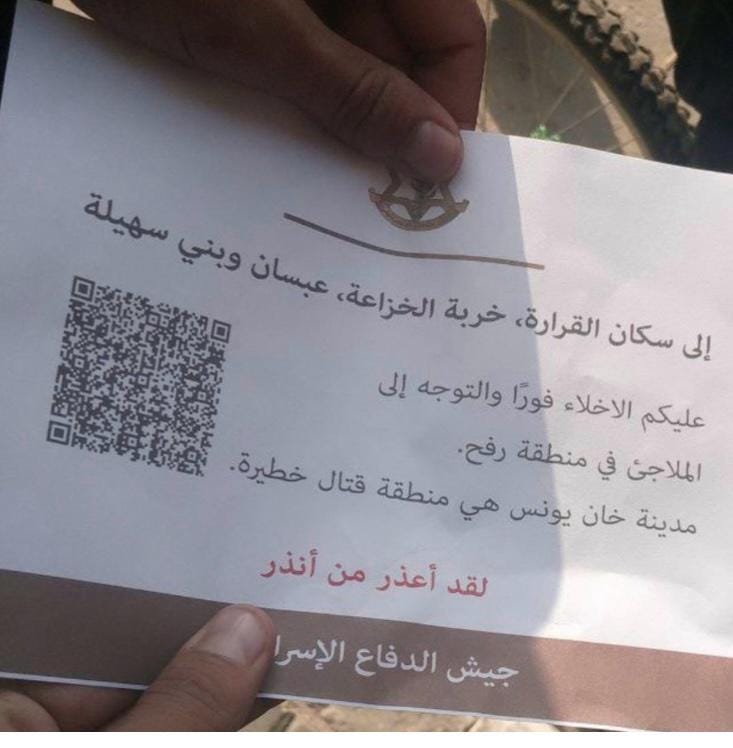
One of the leaflets dropped over Amr’s village
Families in Gaza live together. Whole generations. This is why dozens of family members are killed in a single air strike. Amr grew up surrounded by uncles, aunts and cousins.
The villagers panicked. Some began to pack. Some refused to leave.
One of Amr’s uncles was adamant. He would stay behind while the family would go to the “safe area.” His son was a physician at Nasser Hospital. Amr’s cousin left the hospital to plead with his father to leave. Moments after he and his father fled, their street was bombed.
Amr and his family moved in with relatives in Khan Yunis. A few days later more leaflets were dropped. Everyone was told to go to Rafah.
Amr’s family, now joined by relatives from Khan Yunis, fled to Rafah.
Rafah was a nightmare. Desperate Palestinians were living in the open air and on streets. There was little food or water. The family slept in their car. It was cold and rainy. They did not have blankets. They looked desperately for a tent. There were no tents. They found an old sheet of plastic, which they attached to the back of the car to make a protected area. There were no bathrooms. People relieved themselves on the side of the road. The stench was overpowering.
They had been displaced twice in the span of a week.
Amr’s father, who has diabetes and high blood pressure, fell sick. The family took him to the European Hospital near Khan Yunis. The doctor told him he was ill because he was not eating enough.
“We can’t handle your case,” the doctor told him. “There are more critical cases.”
“He had a beautiful house,” Abdallah says of his older brother. “Now he is homeless. He knew everyone in his hometown. Now he lives on the street with crowds of strangers. No one has enough to eat. There is no clean water. There are no proper facilities or bathrooms.”
The family decided to move again to al-Mawasi, designated a “humanitarian area” by Israel. They would at least be in open land, some of which belonged to their family. The coastal area, filled with dunes, now holds some 380,000 displaced Palestinians. The Israelis promised the delivery of international humanitarian aid to al-Mawasi, little of which arrived. Water has to be trucked in. There is no electricity.
Israeli warplanes hit a residential compound in al-Mawasi in January where medical teams and their families from the International Rescue Committee and Medical Aid for Palestinians were housed. Several were injured. An Israeli tank fired on a house in al-Mawasi where staff from Médecins Sans Frontières and their families were sheltering in February, killing two and injuring six.
Amr’s family set up two makeshift tents with palm tree leaves and sheets of plastic. Israeli drones circled overhead night and day.
On the day before he was killed, Amr managed to get a phone connection — telecommunications are often cut — to speak to his sister in Canada.
“Please get us out of here,” he pleaded.
The Egyptian firm Hala, which means “Welcome” in Arabic, provided travel permits for Gazans to enter Egypt for $350, before the Israeli assault. Since the genocide began, the firm has raised the price to $5,000 for an adult and $2,500 for a child. It has sometimes charged as much as $10,000 for a travel permit.
Hala has offices in Cairo and Rafah. Once the money is paid — Hala only accepts U.S. dollars — the name of the applicant is submitted to Egyptian authorities. It can take weeks to get a permit. It would cost around $25,000 to get Amr’s family out of Gaza, double that if they included his widowed aunt and three cousins. This was not a sum Amr’s relatives abroad could raise quickly. They set up a GoFundMe page here. They are still trying to collect enough money.
Once Palestinians get to Egypt, the permits expire within a month. Most of the Palestinian refugees in Egypt survive on money sent to them from abroad.
Amr awoke in the dark. It was the first Friday of Ramadan. He joined his family in the morning prayer. The Fajr. It was 5 a.m.
Muslims fast in the day during the month of Ramadan. They eat and drink once the sun goes down and shortly before dawn. But food was now in very short supply. A little olive oil. The spice za’atar. It was not much.
They went back to their tents after prayers. Amr was in the tent with his aunt and three cousins. A shell exploded near the tent. Shrapnel tore apart his aunt’s leg and critically injured his cousins. Amr frantically tried to help them. A second shell exploded. Shrapnel ripped through Amr’s stomach and exited from his back.
Amr stood up. He walked out of the tent. He collapsed. Older cousins ran towards him. They had enough gas in their car — fuel is in very short supply — to drive Amr to Nasser Hospital, three miles away.
“Amr, are you okay?” his cousins asked.
“Yes,” he moaned.
“Amr, are you awake?” they asked after a few minutes
“Yes,” he whispered.
They lifted him from the car. They carried him into the overcrowded corridors of the hospital. They set him down.
He was dead.
They carried Amr’s body back to the car. They drove to the family’s encampment.
Amr’s uncle shows me a video of Amr’s mother keening over his corpse.
“My son, my son, my beloved son,” she laments in the video, her left hand tenderly stroking his face. “I don’t know what I will do without you.”
They buried Amr in a makeshift grave.
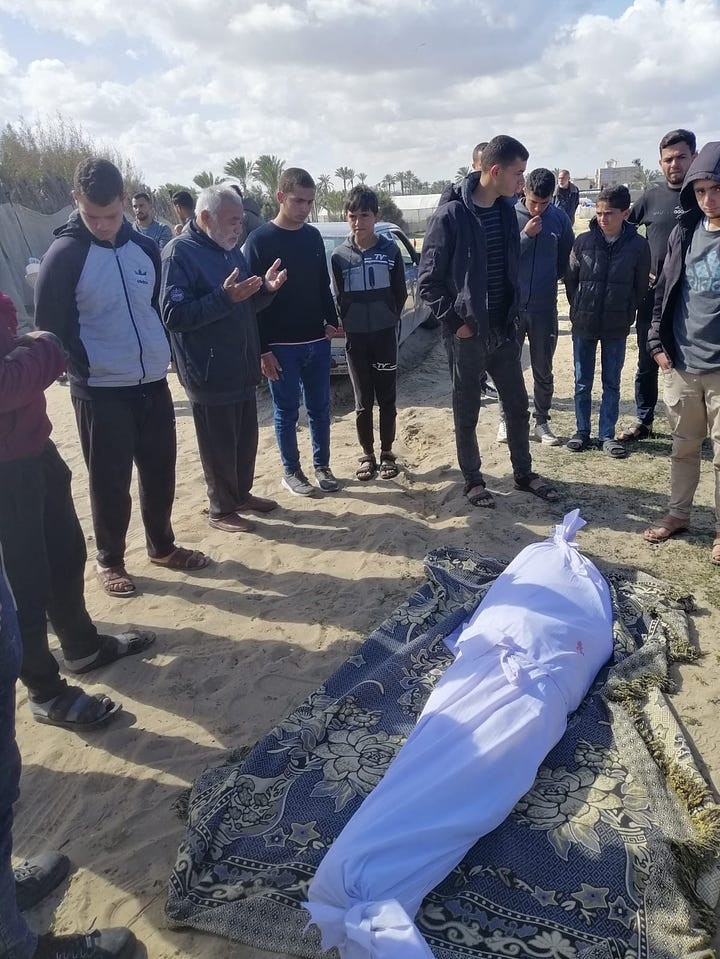
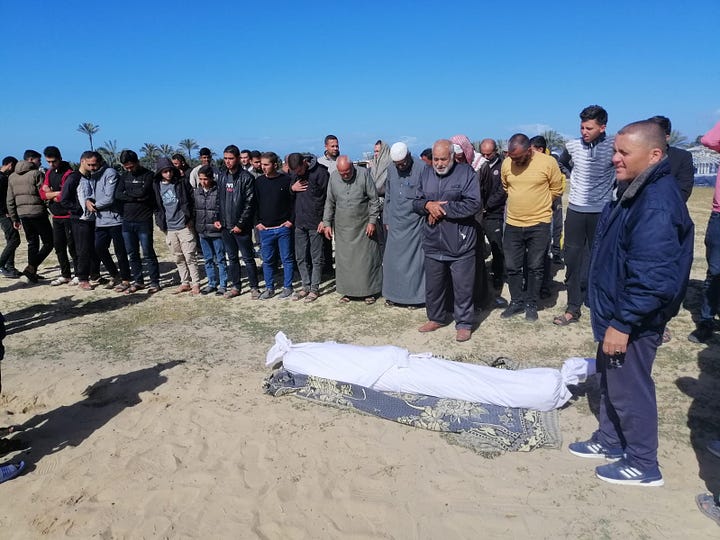
Amr’s Burial
Later that night the Israelis shelled again. Several Palestinians were wounded and killed.
The empty tent, occupied the day before by Amr’s family, was obliterated.
______________________________________________
 Chris Hedges is a Pulitzer Prize–winning journalist who was a foreign correspondent for fifteen years for The New York Times, where he served as the Middle East Bureau Chief and Balkan Bureau Chief. He previously worked overseas for The Dallas Morning News, The Christian Science Monitor, and NPR. He used to be the host of the Emmy Award-nominated RT America show On Contact.
Chris Hedges is a Pulitzer Prize–winning journalist who was a foreign correspondent for fifteen years for The New York Times, where he served as the Middle East Bureau Chief and Balkan Bureau Chief. He previously worked overseas for The Dallas Morning News, The Christian Science Monitor, and NPR. He used to be the host of the Emmy Award-nominated RT America show On Contact.
Copyright 2024 Chris Hedges
Go to Original – chrishedges.substack.com
Tags: Colonialism, Crimes against Humanity, Ecocide, Ethnic Cleansing, Famine, Gaza, Genocide, Genocide Convention, Hamas, Hunger, International Court of Justice ICJ, Israel, Israeli occupation, Massacre, Palestine, USA, United Nations, War crimes, West Bank
Join the BDS-BOYCOTT, DIVESTMENT, SANCTIONS campaign to protest the Israeli barbaric siege of Gaza, illegal occupation of the Palestine nation’s territory, the apartheid wall, its inhuman and degrading treatment of the Palestinian people, and the more than 7,000 Palestinian men, women, elderly and children arbitrarily locked up in Israeli prisons.
DON’T BUY PRODUCTS WHOSE BARCODE STARTS WITH 729, which indicates that it is produced in Israel. DO YOUR PART! MAKE A DIFFERENCE!
7 2 9: BOYCOTT FOR JUSTICE!
DISCLAIMER: The statements, views and opinions expressed in pieces republished here are solely those of the authors and do not necessarily represent those of TMS. In accordance with title 17 U.S.C. section 107, this material is distributed without profit to those who have expressed a prior interest in receiving the included information for research and educational purposes. TMS has no affiliation whatsoever with the originator of this article nor is TMS endorsed or sponsored by the originator. “GO TO ORIGINAL” links are provided as a convenience to our readers and allow for verification of authenticity. However, as originating pages are often updated by their originating host sites, the versions posted may not match the versions our readers view when clicking the “GO TO ORIGINAL” links. This site contains copyrighted material the use of which has not always been specifically authorized by the copyright owner. We are making such material available in our efforts to advance understanding of environmental, political, human rights, economic, democracy, scientific, and social justice issues, etc. We believe this constitutes a ‘fair use’ of any such copyrighted material as provided for in section 107 of the US Copyright Law. In accordance with Title 17 U.S.C. Section 107, the material on this site is distributed without profit to those who have expressed a prior interest in receiving the included information for research and educational purposes. For more information go to: http://www.law.cornell.edu/uscode/17/107.shtml. If you wish to use copyrighted material from this site for purposes of your own that go beyond ‘fair use’, you must obtain permission from the copyright owner.
Read more
Click here to go to the current weekly digest or pick another article:
PALESTINE - ISRAEL:
